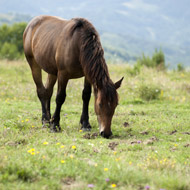Horse microchipping to become mandatory

"...it is completely unacceptable that hundreds of horses and ponies are left abandoned every year by irresponsible owners."
Defra has introduced new legislation making it compulsory for horses, ponies and donkeys to be microchipped by October 2020, in a bid to prevent abuse and improve welfare.
A new Central Equine Database will allow local authorities and police to trace the owners of abandoned horses and make it easier to rehome the animals, or reunite those that are lost or stolen with their owners.
Those who fail to comply with the new rules will face sanctions from the local authority, including a compliance notice or fines of up to £200.
Earlier this year, the RSPCA revealed it had rescued around 1,000 horses in 2017, the vast majority of which were not microchipped, making it almost impossible to trace their owners. Inspectors often saw horses that had been abandoned whilst very sick, dying or even dead.
Animal welfare minister Lord Gardiner said: “The government shares the British public’s high regard for animal welfare and it is completely unacceptable that hundreds of horses and ponies are left abandoned every year by irresponsible owners.
“That is why we have today laid new regulations in Parliament requiring horses to be microchipped. This will bolster the ability of local authorities and police to identify abandoned animals, ensuring these beautiful creatures receive the care they deserve and that those who mistreat them will face the consequences.”
Chair of the British Horse Council, Jeanette Allen, said the legislation is a “huge advance” for the UK’s horses, ponies and donkeys.
She added: “It will not only enable irresponsible owners to be held properly accountable for the treatment of their animal, it will also aid in reuniting owners with lost or stolen horses and significantly supports the UK’s efforts to protect our equines from disease outbreaks.”
The regulations were laid in parliament on 25 June and, subject to parliamentary approval, will come into force on 1 October 2018.



 The latest
The latest